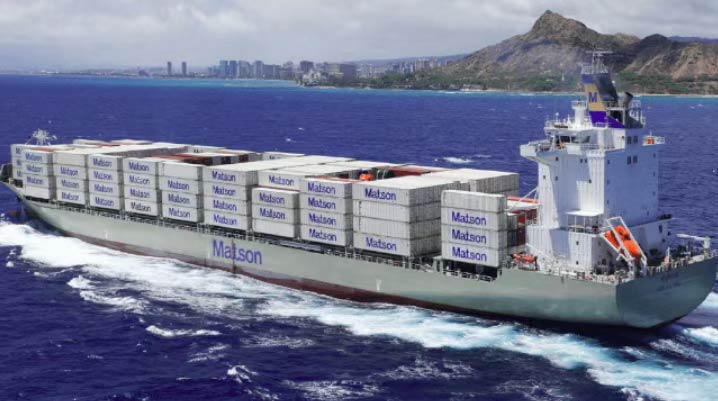

Matson announced the suspension of booking for this type of battery cargo
Recently, Matson has suspended the transportation of electric vehicles (EVs) and plug-in hybrid electric vehicles (PHEVs), citing the fire hazard posed by the batteries.
In a letter to customers, Matson wrote: "Due to growing concerns about the safety of large lithium-ion battery-powered transport vehicles, Matson will suspend the acceptance of old or new electric vehicles (EVs) and plug-in hybrid vehicles (PHEVs) for transportation on its vessels." As of today, we have stopped accepting new reservations for these goods from all industries.
The Hawaii Electric Vehicle Association reports that there are currently over 37,000 registered electric vehicles in the state. Guam has not released relevant data, but dealers interviewed by local media said they regretted the decision and emphasized that electric vehicles are very suitable for driving in Guam.
Matson has previously reported that it has developed a team-based approach to address the complexity of carrying lithium batteries. It established a working group for the safe transportation of electric vehicles and stated that it is participating in external working groups for electric vehicles and lithium batteries.
On land, Matson said, the lithium battery handling procedure includes a review process and a list of used battery transportation, while on board, it formulates procedures on how to extinguish lithium fires and how to prevent them from happening. This includes proper loading, the use of new tools such as thermal imagers to observe temperature peaks, and the deployment of Viking HydroPen, a fire-fighting tool that replaces traditional water mist guns and can drill into containers to extinguish fires.
In a letter to customers, Matson wrote: "Matson continues to support the industry's efforts to develop comprehensive standards and procedures to address the fire risks posed by lithium-ion batteries at sea and plans to resume acceptance of them when appropriate safety solutions that meet our requirements are implemented."
The report cited the recent fire on the Morning Midas near the Aleutian Islands and the losses of ships carrying electric and hybrid vehicles. This is at least the third major casualty incident related to electric vehicle fires after the fire on Fremantle Highway in 2023 and the loss of Felicity Ace in 2022. The automotive industry has been striving to set new standards for transporting electric vehicles and lithium-ion batteries, but Matson is transporting cars placed in containers. Compared with car roll-on/roll-off ships, this limits the monitoring capacity for vehicles and increases the risk of container fires.
Matson continues to transport traditional cars. It offers transoceanic services and, as part of its barge services, transports containers between the islands of Hawaii.

In a letter to customers, Matson wrote: "Due to growing concerns about the safety of large lithium-ion battery-powered transport vehicles, Matson will suspend the acceptance of old or new electric vehicles (EVs) and plug-in hybrid vehicles (PHEVs) for transportation on its vessels." As of today, we have stopped accepting new reservations for these goods from all industries.
The Hawaii Electric Vehicle Association reports that there are currently over 37,000 registered electric vehicles in the state. Guam has not released relevant data, but dealers interviewed by local media said they regretted the decision and emphasized that electric vehicles are very suitable for driving in Guam.
Matson has previously reported that it has developed a team-based approach to address the complexity of carrying lithium batteries. It established a working group for the safe transportation of electric vehicles and stated that it is participating in external working groups for electric vehicles and lithium batteries.
On land, Matson said, the lithium battery handling procedure includes a review process and a list of used battery transportation, while on board, it formulates procedures on how to extinguish lithium fires and how to prevent them from happening. This includes proper loading, the use of new tools such as thermal imagers to observe temperature peaks, and the deployment of Viking HydroPen, a fire-fighting tool that replaces traditional water mist guns and can drill into containers to extinguish fires.
In a letter to customers, Matson wrote: "Matson continues to support the industry's efforts to develop comprehensive standards and procedures to address the fire risks posed by lithium-ion batteries at sea and plans to resume acceptance of them when appropriate safety solutions that meet our requirements are implemented."
The report cited the recent fire on the Morning Midas near the Aleutian Islands and the losses of ships carrying electric and hybrid vehicles. This is at least the third major casualty incident related to electric vehicle fires after the fire on Fremantle Highway in 2023 and the loss of Felicity Ace in 2022. The automotive industry has been striving to set new standards for transporting electric vehicles and lithium-ion batteries, but Matson is transporting cars placed in containers. Compared with car roll-on/roll-off ships, this limits the monitoring capacity for vehicles and increases the risk of container fires.
Matson continues to transport traditional cars. It offers transoceanic services and, as part of its barge services, transports containers between the islands of Hawaii.





